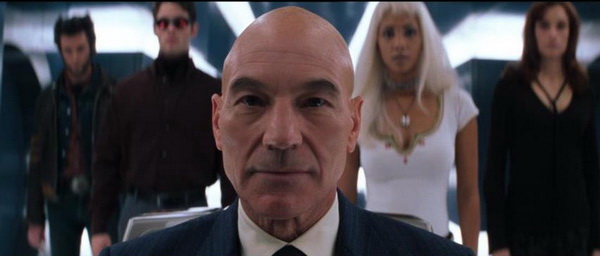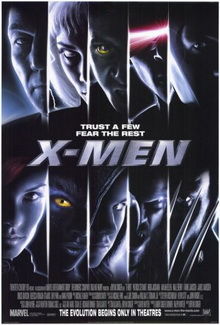 I don’t remember why I went to see X-Men when it came out in theaters in 2000. Twelve years ago, I was not a fan of comic books or superheroes. It’s occurred to me that it might have had something to do with Hugh Jackman, but looking at his filmography, I see that this movie must have been my introduction to Hugh Jackman. However, being a big fan of Star Trek: the Next Generation, perhaps I was intrigued to see Patrick Stewart in a role other than Captain Picard. But most probably, one of my kids told me this movie would be good, and wanted me to take them to see it, so I did.
I don’t remember why I went to see X-Men when it came out in theaters in 2000. Twelve years ago, I was not a fan of comic books or superheroes. It’s occurred to me that it might have had something to do with Hugh Jackman, but looking at his filmography, I see that this movie must have been my introduction to Hugh Jackman. However, being a big fan of Star Trek: the Next Generation, perhaps I was intrigued to see Patrick Stewart in a role other than Captain Picard. But most probably, one of my kids told me this movie would be good, and wanted me to take them to see it, so I did.
And was pleasantly surprised.
I didn’t know anything about Marvel comics at the time, and if someone had told me this was based on a DC comic, or a novel, or a TV show, or was a completely original script, I wouldn’t have batted an eye. Of course today I know better. But none of this matters. Because whether you know the source material or not, this first X-Men movie stands on its own.
I admit, it works better for me today, knowing more about the Marvel Universe, but back then it still worked, and very well. In fact, it worked so well that this DVD was one of the first I put in my collection, and through the years a good amount of housework has been accomplished with X-Men playing in the background.
Something about the X-Men appeals to me. Is it the idea of being different, an outsider, shunned by society? Is that what touches a nerve with me? As children and teenagers, we tend to see ourselves, at least to some degree, as inferior, and thus, ostracized. There’s certainly a strong theme of persecution and alienation running through the X-Men movies. Anyone who’s ever suffered even the slightest hint of an inferiority complex and/or persecution, either real or imagined, will probably connect on that level, if nothing else.
But of course, the mutants of X-Men, though different, are not inferior to the general population. They’re superior! What kid or teenager wouldn’t like to think they’re actually better than the society that spurns them? And how many adults still have a little bit of that kid or teenager still lurking about in their psyche?
I think that’s what grabs me about these movies.
But let’s not get ahead of ourselves. For right now, I’m not talking about “these movies,” only this one movie. It begins with Jean Grey and Senator Kelly debating whether or not mutants should be “registered” so everyone can know who and where they are, and what they can do. As much as I tend to side with outcasts and underdogs, I hate to say it, but I can totally see the Senator’s point. It’s a little scary to think about all these potentially angry young people walking around with superpowers.
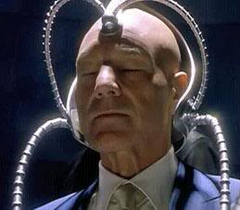 But of course that’s what’s so perfect about Professor X’s School for the Gifted. What a great place of acceptance, growth, and fellowship. The grounds and the rooms are beautiful, calming and comfortable. Who wouldn’t want to be there?
But of course that’s what’s so perfect about Professor X’s School for the Gifted. What a great place of acceptance, growth, and fellowship. The grounds and the rooms are beautiful, calming and comfortable. Who wouldn’t want to be there?
And Professor X is the best. I mean…isn’t he? He’s like the most evolved person on the planet. (It totally makes sense to have Patrick Stewart in the role.)
Enter Wolverine, our bad boy. I could do without the hairstyle, but I guess that’s how he’s portrayed in the comics (I haven’t read up to Wolverine yet). I’m glad they lost the hairstyle early in the movie, but kept the surly attitude. He’s the loner, the mutant who is  so far gone, he’s not seeking acceptance, he just wants to be left alone (kind of like Hulk).
so far gone, he’s not seeking acceptance, he just wants to be left alone (kind of like Hulk).
Of course, once he falls in with Professor X and his gang of mutants, there’s no way he can remain a loner. Actually, I think that actually happens before he gets to the school, when he meets Rogue. He tries at first to get rid of her, but his conscience won’t let him. They share a bond, become friends. When she runs away and he finds her on the train, he tells her “Don’t worry, I’ll take care of you.” It’s a great moment. The writers really knew what to do with this character, softening him up just a little, but not too much.
I like Jean Grey as the no-nonsense scientist, and I guess I understand why she’s attracted to Logan (but of course won’t admit it). Her boyfriend Scott/Cyclops is the Captain America type, Mr. Whitebread/Dudley Do-Right, and of course she should be happy with him. But for someone as smart as she is, maybe he’s a little too boring–despite the fact that he can blow holes in Grand Central Station with his eyes. I don’t know. A low-key love triangle is set in place, but I’m not really buying it.
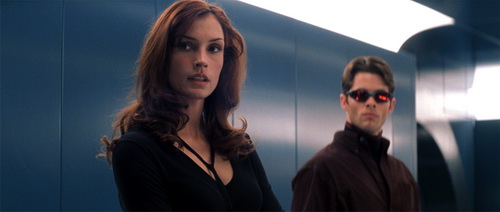
Towards the end, Jean Grey tells Logan she thinks Rogue is “a little taken” with him, to which Logan replies, “Tell her my heart belongs to someone else.” When I heard that, I asked…who? Oh! You mean…HER?? Jean Grey. Wait…really? I didn’t see it. It felt forced. The whole love triangle thing just doesn’t work for me. Well…it provides a few amusing moments of tension between Logan and Scott, but beyond that, what’s the point? I mean, is there not enough going on in the movie already, we have to add in this lame love triangle?
Of course there IS enough going on in the movie. We’ve got our villain, Magneto. And in case you were planning to just hate him, the filmmakers won’t let you. The movie starts with Magneto as a boy, in Nazi Germany, being torn from his family. 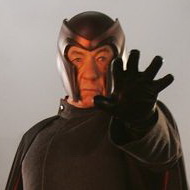 If that scene doesn’t touch you, nothing will. So now we understand WHY Magneto is so angry and evil, but…we kind of don’t blame him.
If that scene doesn’t touch you, nothing will. So now we understand WHY Magneto is so angry and evil, but…we kind of don’t blame him.
Can’t we just have our villains straight up? That would be too easy. And really, there’s nothing easy about this movie. The only thing that IS easy is the ability to see both sides of the story.
Senator Kelly is good for that. He starts out as the Number One advocate against mutants, but once Magneto uses his machine to turn Kelly into a mutant himself, of course he becomes more understanding. Then he pays for his sins by exploding into a pool of water, death by extreme mutation.
Or does he? Is he really dead? When Storm said, “I saw Senator Kelly die,” and Magneto replied, “Are you sure you saw what you saw?” Russ paused the movie. It’s the kind of line that can go by quickly on a first hearing, but if you stop to think about it, it really makes you wonder.

What is Magneto saying there? What does he know that nobody else knows? Or does he not know anything? Is he just trying to throw some doubt into the mix, to create confusion when his ally, the blue woman Mystique, will later take on the form of Senator Kelly, now campaigning against mutant registration? In the last scene, we know it’s Mystique, not the Senator, because we see the yellow glint in the eyes. But that doesn’t prove that Senator Kelly is dead. You would think collapsing into a puddle of water would prove he’s dead, but remember…we’re dealing with mutations here. Just because you’ve collapsed into a puddle of water, doesn’t necessarily mean you can’t regroup and reform as…something else.
We won’t see Senator Kelly again in the next two movies. Well, we will see him, but it will be Mysique, not Senator Kelly. So then, can we assume the filmmakers were not setting us up for his return? Or is there yet something else coming down the pike? Remember, if you don’t see a body, they ain’t dead. And in the end, there is no body.
I don’t know if it’s important whether or not he might come back. It’s just an interesting point, brought up by Magneto’s offhand line “Are you sure you saw what you saw?” And it supports my contention that in this world, nothing is 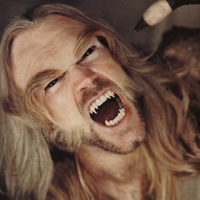 black and white, nothing is easy…and nothing is what you think it is.
black and white, nothing is easy…and nothing is what you think it is.
One of the best moments in the movie, where nothing is what you think it is, comes when Wolverine and Magneto first meet, on the train. Of course everyone has been under the impression that Magneto sent his henchman Sabertooth to attack Wolverine’s truck and capture the regernative man of metal. But why? For what evil purpose? And then on the train we quickly find out that Magneto couldn’t give two hoots about Wolverine. It’s Rogue he’s after! Ka-BOOM! Nice touch, that bit of misdirection.
In the end, Magneto uses Rogue’s ability to channel mutant powers to carry out his evil plan to force mutation on the general public, but the X-Men, in their black leather uniforms (“What would you prefer? Yellow spandex?”) thwart him at the last possible moment. Rogue survives, and gets some cool highlights in her hair. Then, Wolverine, ever the loner, sets out on a “borrowed” motorcycle to seek answers about his mysterious past. Our villain Magneto is contained in a “plastic prison” where he can do no harm, and is visited by his old buddy, who is also his nemesis, Professor Xavier.
Having now seen all the movies, and having read some of the comics, this world is richer for me than it was twelve years ago. Knowing what came before, and what comes next brings a new and exciting dimension to the saga. And it is a saga, a very big story about a particularly fascinating world. The world of the X-Men is gritty and troubled, with no clear-cut answers to the problems that plague their society. Nothing is easy, nothing is black and white, and way too often, nothing is what it seems.
The X-Men may not live in my favorite corner of the Marvel Universe, but it’s still a damned good corner. Whenever heroes work together, good triumphs over evil, and there is a refuge for the lonely, persecuted and misunderstood, as far as I’m concerned, this is a world worth visiting, exploring, and learning more about.
